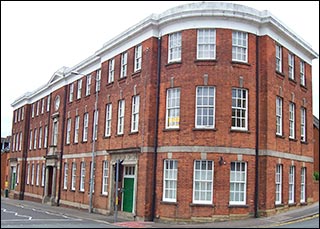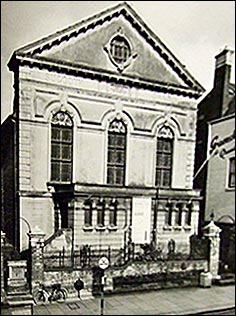|
|
||||||||
| From an interview with Rae Drage 25.2.2008. Transcribed by Jacky Lawrence |
||||||||
|
Betty Smith - Work in the Co-op - Alfred Street Bombing - the Succoth Chapel
|
||||||||
|
||||||||
|
Well, I was a junior in the office there and I used to take all these books around, you know all the different departments and I always finished up in Vic's office up on the third floor. I don't know what he did there it was something to do with the ordering and I was standing there talking and I looked out of the window and I saw this plane go over and I saw these sort of things falling, didnât realise they were bombs and all of a sudden I saw this sort of big cloud and then we heard the bombs and when it cleared a bit I said. "Oh," I said, "We bin bombed, the school's been hit." Because the dentist's was gone, that was over the school you see, it was a double storey and the next thing I know of it a cloud of dust and I didn't realise he'd got a little boy at the school there.
So I go downstairs and I get down the bottom and Mr. Neal comes out, who was the manager, and he said. "What's happened?" I said. "Oh, the school's been bombed." Three of the other men dashed out because they'd got children there you know and then we went, we all followed, we went into the air raid shelters that were at the back of Portland Road. You know the back of there and then after about an hour they sent us all home because everybody were trying to find out what was happening like you know.
And I tell you this we live up St. Margaret's Avenue, I get to the bottom of St. Margaret's Avenue, my dog's there tied up and there's a shop there and the shopkeeper says a boy from Alfred Street brought her and said that your mother gave him sixpence to bring him there and tie him up. So I took him home, we lived at the top of St. Margaret's Avenue and there were no sign of my mother. My father comes and my grandfather comes so dinner's all ready, so I put the dinner out and she finally turns up at 8 o'clock at night. Apparently she was sitting in the barbers and she were coming down to find if I was all right. Well, she got along Duck Street and found it was Alfred Street and she had been in the Ambulance Brigade and the ambulances were there. They'd got young girls of eighteen on and course when they sort of went in and saw these children, they weren't any good at all. And apparently they'd got one of the old ambulance ladies there and one of the drivers knew my mother and he said. "Come on Elsie," he said. "We need you." So she was the first. They took the injured ones to the hospital, either Wellingborough or Northampton, and then they had to take the dead bodies. She said it wasn't too bad 'til the last one and she said that upset her because she knew the ladies. I went to school with two of her daughters and she got four girls and she'd got a little boy and it was the little boy that was killed and that really upset her. And she came home and she was on the ambulance the rest of the War, served on them. And when Roberts Street was bombed you see she said that really upset her because she lived up Roberts Street for fifteen years before she was married. So when they bought the bodies out she had to identify everybody you know that's it. There were about four houses gone you know but she said she came round and got me up, I know it was only about half past five in the morning, and sent me round to tell my grandfather that his friends at the bottom were all right because he'd lived there for quite a while you know and he'd got friends there and that. And he worked up this way you know and she didn't want him to hear it and worrying about it. It were about three days later and I had to go upstairs to the manager's, Mr Clipston's office, and there were these two RAF officers and they asked me to tell them what had happened. Apparently, they said there was this postman who'd seen it. He'd just, coming in St. Mary's Avenue and the bombs dropped of course and the blast threw him off his bike down into the field. And I seen it but nobody else had see, I don't suppose anybody was looking up like that you see. Where I was up three stories high, so I was sort of level with it and he was up high in St. Mary's Avenue so he was sort of level with it, you know. And they said about that and they said we were very lucky in Rushden. It either dropped a second too early or a second too late but heâd been aiming for the gas bit and also for the station railway station and then the Co-op factory and then the John White's. That was the big one next to the Church, you know, thatâs what he was aiming for but of course he missed it and he caught the school instead and the factory across the street and also the Hotel and the fish and chip shop at the top of Duck Street, that was out and then the. And I think the last three bombs they sort of finished up in the field at the back of St. Mary's Avenue. I know there were these big craters there for a long while you know but well they got filled in.
At the Intermediate School there were Miss Boyes she finished up as headmistress of the girls school. And there were Miss Butlin, she got married after the war. Do you remember Butlins the wool shop in the High Street, well that was her sister in law and then there was Mrs Hensman. Oh yes, we were terrified of her, she'd walk into a class and look at us and there weren't a sound you know and the boys were the same. 'Cos at the Intermediate there were six classes, three of boys and three of girls. Now for History and, everything was set except for History and Geography and then we had mixed classes for that. Half boys, half girls and what was his name, Mr Entwhistle, he taught us. He was killed during the war, yes, when they were, just before Dunkirk because he was a, he was in the Territorials I think and he went at the beginning of the war. And he came to see us in May 'cos I've got a photo of the school and he's sitting there in his uniform and he went back and I know it was only two or three weeks later, they had us in the hall and they told us that he'd been killed on the retreat to Dunkirk. I've got two school photos. He was ever such a good teacher, I know he took us to the church and told us how, and I know he showed us few basic tools that they built the church with, that they had in those days, you know. He was very interested you know, he made you interested in things. The year we broke up in July and they said that was the last time they were leaving school at fourteen. We got to stop on two years then, in September, the war started so we go back to school and the first thing they say was you can leave directly you're fourteen. Well, my birthday weren't 'til June so I had the complete year until the end of June but I mean otherwise they were leaving all through the year that was it.
|
||||||||
|
|
||||||||
|
|


